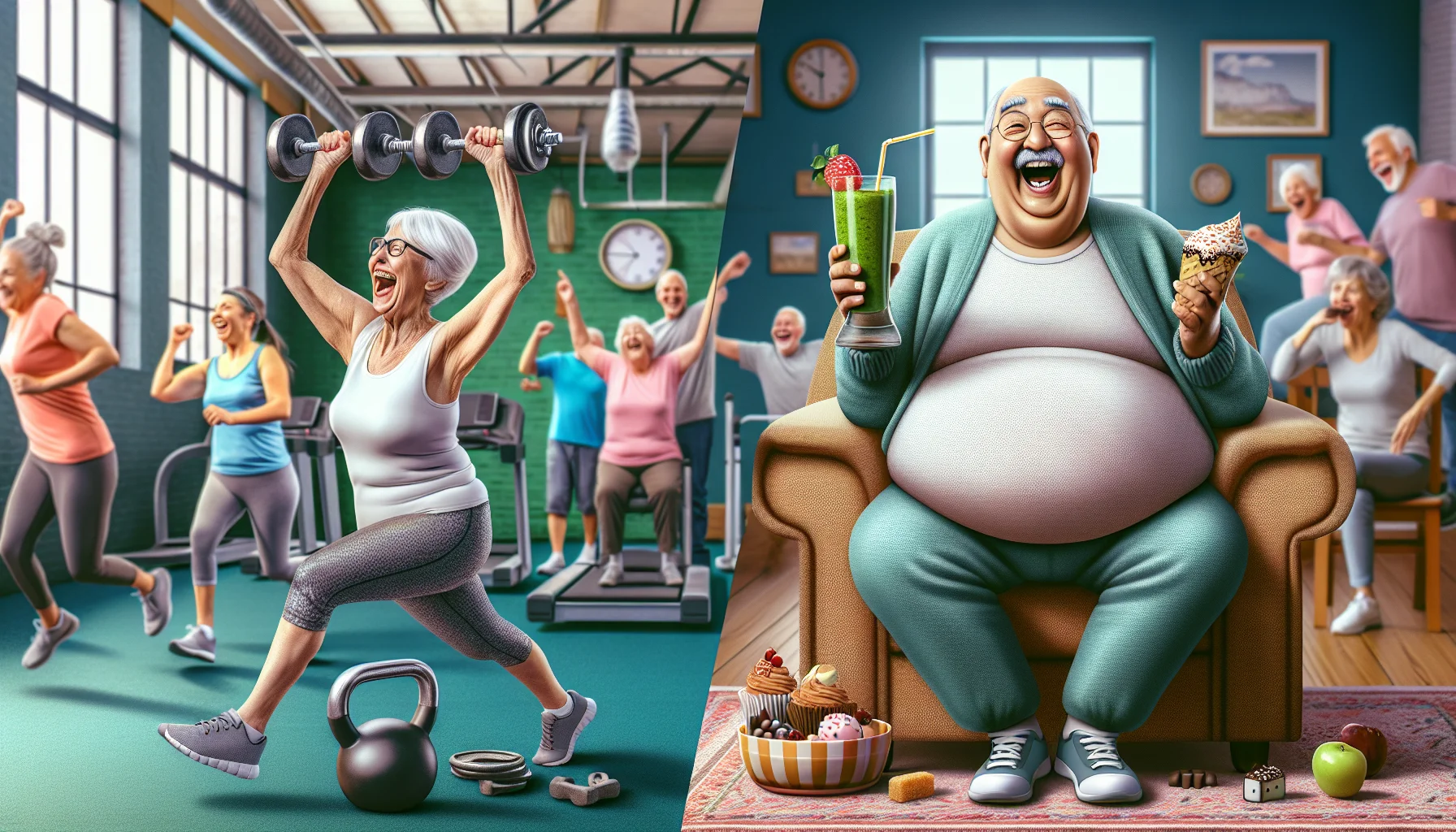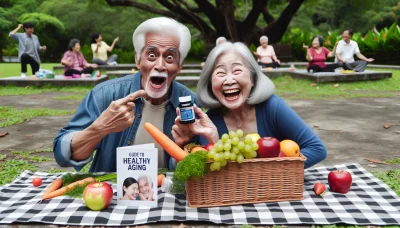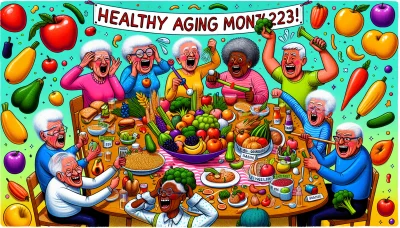Ageing vs aging Quiz
Test Your Knowledge
Question of
Understanding Aging: Definitions and Variations
The Science of Aging
Aging is an inevitable, complex process that affects all living organisms. It involves a gradual decline in physiological functions, increasing the risk of disease and death. Research in gerontology reveals that aging is not solely due to wear and tear but also involves genetic factors that determine lifespan and healthspan.
The biological processes of aging are characterized by a decrease in cellular function, accumulation of molecular damage, and a decline in regenerative capacities. This results in visible signs such as wrinkles and gray hair, as well as less evident changes like slowed metabolism and weakened immunity.
Psychologically, aging can affect cognitive function, emotional well-being, and social engagement. While some individuals experience a decline in mental faculties, others maintain high cognitive function through neuroplasticity and mental exercises. Mental health can be influenced by how society views aging.
Social implications of aging are profound. They encompass changing roles within the family, workplace, and community. Societies face challenges to support an aging population with adequate healthcare, retirement systems, and opportunities for continued contribution and engagement.
Aging vs Ageing: Spelling Differences
The spelling difference between 'aging' and 'ageing' stems from variations in American and British English. In American English, 'aging' is the standard spelling used across various texts including academic and medical publications.
In contrast, British English prefers 'ageing,' reflecting the general pattern of maintaining 'e' before the suffix '-ing.' This variant appears in UK-based literature and communications.
Contextual use in academic and medical texts often aligns with the regional spelling conventions of the authors or institutions. However, both spellings are understood globally and used interchangeably in international contexts.
Perceptions of Aging Across Cultures
Eastern perspectives on aging traditionally honor elders for their wisdom and experience. Many Asian cultures prioritize familial respect for older generations, viewing them as an integral part of society with valuable insights.
In Western societies, views on aging can be quite different. There's often an emphasis on youthfulness and maintaining independence into old age. The Western perspective may focus more on anti-aging interventions than embracing natural aging processes.
- The Role of Language: Language shapes cultural perceptions of aging. Terms like 'senior citizen' or 'elderly' can carry different connotations depending on cultural norms around respect, autonomy, and value associated with age.
- Influence of Media: Media representation significantly impacts societal attitudes towards aging. Cultures with positive media portrayals of older individuals tend to have more respectful attitudes toward them.
- Societal Structure: The societal structure also plays a role; collectivist societies might view aging as a communal journey while individualistic cultures emphasize personal achievement regardless of age.
- Cultural Practices: Traditional practices such as retirement ceremonies or coming-of-age rituals highlight cultural stances on life transitions related to age.
- Economic Factors: Economic stability can influence how cultures care for their elderly population wealthier societies might afford better healthcare which can lead to differing perceptions about the quality of life in old age.
The Impact of Diet on the Aging Process
Nutritional Needs for Healthy Aging
As we age, our bodies undergo significant changes that affect nutritional requirements. A diet rich in essential nutrients can mitigate the effects of aging and promote longevity. It's crucial to focus on a balanced intake that supports cellular repair and immune function.
Essential Vitamins and Minerals: Vitamins B, D, C, and E, along with minerals like magnesium and potassium, play pivotal roles in maintaining health during aging. They contribute to nerve function, energy production, and the protection against oxidative stress.
Caloric Intake and Metabolism Changes: Metabolic rates decrease with age, necessitating adjustments in caloric intake to maintain a healthy weight. However, nutrient density must remain high to avoid deficiencies that can exacerbate the aging process.
Hydration and Aging: Water is vital for all life stages but becomes even more critical as we get older. Adequate hydration helps maintain kidney function, aids digestion, and can prevent common aging complications such as urinary tract infections and constipation.
Popular Diets and Their Effects on Aging
The dietary choices we make can significantly impact how well we age. Popular diets often target specific health outcomes that may also influence the aging process either positively or negatively.
Mediterranean Diet and Longevity: The Mediterranean diet is renowned for its association with increased lifespan. Its emphasis on fruits, vegetables, whole grains, and healthy fats supports heart health and reduces the risk of chronic diseases.
Plant-Based Diets and Cellular Aging: Diets rich in plant-based foods are linked to longer telomeresa marker of cellular aging. These diets are typically high in antioxidants that combat DNA damage leading to premature cell death.
Low-Carb Diets and Age-Related Diseases: While low-carb diets might aid weight loss, their long-term effects on aging are mixed. It's essential to carefully consider nutrient intake to avoid inadvertently accelerating age-related conditions like osteoporosis or cognitive decline.
Foods to Combat Common Signs of Aging
Certain foods have properties that specifically target signs of aging. Including these in your diet can help you look and feel younger for longer.
- Antioxidant-Rich Foods for Skin Health: Foods high in antioxidants such as berries, dark chocolate, and leafy greens can protect the skin from damage caused by free radicals.
- Omega-3 Fatty Acids for Brain Function: Omega-3s found in fatty fish like salmon enhance brain health and may prevent cognitive decline.
- Calcium and Vitamin D for Bone Density: Dairy products fortified with vitamin D alongside leafy greens provide calcium necessary for maintaining bone density as you age.
Anti-Aging Strategies and Lifestyle Choices
Exercise Regimens to Promote Longevity
Cardiovascular Workouts for Heart Health
Engaging in cardiovascular exercise is crucial for maintaining a strong and healthy heart. Activities like brisk walking, running, or cycling increase heart rate, improving circulation and endurance. Consistency in these workouts is key to reducing the risk of heart disease and stroke, which are prominent concerns as we age.
High-intensity interval training (HIIT) has emerged as a powerful tool to boost cardiovascular fitness. Short bursts of intense activity followed by recovery periods can significantly improve heart health and metabolic function. This type of training can also aid in weight management, an important aspect of aging gracefully.
Strength Training to Prevent Muscle Loss
Muscle mass naturally diminishes with age, but strength training can counteract this decline. Lifting weights or using resistance bands promotes muscle growth, enhances bone density, and increases metabolic rate. Incorporating strength exercises into your routine at least twice a week can make a profound difference in combating sarcopenia the age-related loss of muscle.
Beyond physical benefits, strength training also contributes to better posture and reduces the risk of falls among older adults. Allocating time for these activities helps maintain independence and improves overall quality of life as we get older.
Flexibility and Balance Exercises for Mobility
Maintaining flexibility through stretching or yoga can vastly improve joint range of motion and decrease discomfort associated with aging. Balance exercises such as tai chi reduce the likelihood of falls by enhancing proprioception the body's ability to perceive its position in space. These practices are vital for sustaining mobility and preventing injury.
Regularly engaging in exercises that promote flexibility and balance is not only beneficial for physical health but also offers mental relaxation and stress relief. This holistic approach supports a more active and fulfilling lifestyle as we age.
Mental Health and Cognitive Functioning
Stress Management Techniques
The impact of chronic stress on our bodies intensifies as we age, affecting both physical health and cognitive functioning. Techniques such as mindfulness meditation, deep breathing exercises, or progressive muscle relaxation play a significant role in mitigating stress-related damage.
Developing a routine that incorporates stress-reducing activities can greatly enhance longevity. Not only do these techniques lower blood pressure and improve sleep quality, but they also contribute to a more resilient immune system a critical factor in aging healthily.
Brain Exercises to Enhance Memory
Cognitive decline is not an inevitable part of aging if we actively engage our brains through various exercises. Puzzles, reading, learning new skills, or even playing musical instruments stimulate neuroplasticity, helping maintain memory and processing speed.
It's essential to challenge the brain regularly with new experiences that break from routine. Such mental stimulation has been linked to a decreased risk of developing dementia-related diseases like Alzheimer's.
Social Engagement's Role in Mental Health
Social connections have a profound impact on mental well-being, especially as people age. Maintaining relationships with friends and family boosts mood, reduces the risk of depression, and fortifies cognitive resilience against age-related decline.
Involvement in community groups or volunteer work can provide a sense of purpose and belonging that is fundamental for emotional health throughout the golden years.
Sleep Patterns and Their Relation to Aging
Importance of REM Sleep
Rapid Eye Movement (REM) sleep plays an indispensable role in emotional regulation and memory consolidation. As we age, achieving sufficient REM sleep becomes more challenging yet remains critical for cognitive functioning.
Adequate REM sleep fosters learning capacity and mental sharpness attributes that contribute to a vibrant aging process. It's imperative to prioritize sleep quality alongside other healthy living practices.
Sleep Disorders in Older Adults
Sleep disorders such as insomnia or sleep apnea become more prevalent with age but should not be accepted as normal. These conditions impede restorative sleep cycles leading to daytime fatigue and diminished alertness.
- Lifestyle changes like avoiding caffeine before bedtime,
- Maintaining regular sleep schedules,
- Cultivating a relaxing bedtime routine,
- Seeking medical advice when necessary are all steps towards mitigating these disorders.
- Tips for Improving Sleep Quality
- Create a restful environment by minimizing noise and light pollution,
- Incorporate relaxation techniques before bed,
- Avoid heavy meals close to bedtime,
- and regulate temperature settings for optimal comfort.
Genetics vs Environment: Influences on Aging
Understanding the Genetic Factors of Aging
Genetic factors play a crucial role in determining how we age. Our DNA holds the blueprint for various biological processes that can influence longevity. Research indicates that specific genetic variations are associated with an increased lifespan, suggesting a heritable component to aging.
Telomeres and Cellular Aging : Telomeres are protective caps at the ends of chromosomes that shorten with each cell division. When they become too short, cells can no longer divide, contributing to the aging process. The enzyme telomerase can slow or even reverse this shortening, which has become a significant focus in anti-aging research.
Hereditary Longevity Traits : Certain families exhibit patterns of exceptional longevity, implying that inherited traits can influence lifespan. Studies of these families help scientists understand the complex interactions between genes and aging.
Genetic Predisposition to Age-Related Diseases : Genetics can also determine susceptibility to age-related diseases such as Alzheimer's, heart disease, and diabetes. Identifying genetic risk factors is essential for early intervention and personalized treatment strategies.
Environmental Impacts on the Aging Process
The environment has a profound impact on how we age, with external factors often accelerating or mitigating the natural aging process. Environmental influences such as UV exposure, pollution, nutrition, and lifestyle choices interact with our genetic makeup to shape our overall health and longevity.
Exposure to Sunlight and Skin Aging : Ultraviolet (UV) radiation from sunlight is a significant environmental factor that contributes to skin aging. Chronic UV exposure can lead to photoaging, characterized by wrinkles, loss of skin elasticity, and pigmentation changes.
Pollution and Respiratory Health in Seniors : Air pollution poses a serious threat to respiratory health, particularly in older individuals. Long-term exposure can exacerbate age-related declines in lung function and increase the risk of respiratory diseases.
- Diet rich in antioxidants counteracts oxidative stress caused by pollutants.
- Avoiding tobacco smoke reduces the risk of chronic obstructive pulmonary disease (COPD).
- Regular exercise enhances lung capacity and resistance to environmental toxins.
- Maintaining indoor air quality through proper ventilation and air filters is crucial.
- Monitoring air quality reports helps minimize exposure during high pollution periods.
Combining Genetics and Lifestyle for Optimal Aging
To achieve optimal aging outcomes, it is essential to consider both genetic predispositions and lifestyle factors. By understanding individual genetic profiles, tailored approaches to diet, exercise, and healthcare can be developed to enhance longevity and quality of life.
Personalized Nutrition Plans Based on Genetics : Nutrigenomics explores how food interacts with our genes. Personalized nutrition plans that consider individual genetic differences hold promise for preventing age-related diseases and promoting healthy aging.
Preventative Healthcare Strategies : Proactive health screenings based on genetic risks can detect potential issues early on. Moreover, lifestyle modifications like smoking cessation and regular physical activity are powerful tools for preventing age-associated health decline.
The Future of Anti-Aging Research : The integration of genomics into medical practice is revolutionizing anti-aging strategies. Ongoing research into gene therapy, stem cell treatments, and other innovative technologies offers hope for extending healthy lifespans well beyond current expectations.
Hormonal Changes and Their Effects on Aging
Menopause and Aging in Women
Menopause marks a significant transition in a woman's life, typically occurring in the late 40s to early 50s. This natural aging process signifies the end of menstrual cycles due to hormonal shifts, primarily a decline in estrogen and progesterone. These hormonal changes are pivotal, influencing various aspects of health and well-being.
As estrogen levels drop, women often experience a range of symptoms. Hot flashes, mood swings, and sleep disturbances are common. The severity varies widely; some may navigate menopause with minimal discomfort, while others face substantial challenges requiring medical attention or lifestyle adjustments.
Symptoms and Management of Menopause
Managing menopausal symptoms can involve lifestyle changes like diet and exercise modifications. For many women, these adjustments can alleviate symptoms without further intervention. Non-hormonal medications can also play a role in managing specific symptoms such as hot flashes or vaginal dryness.
Additionally, complementary therapies such as acupuncture or herbal supplements have gained popularity. However, it's crucial to consult healthcare providers before starting any new treatment to ensure safety and efficacy.
Hormone Replacement Therapy (HRT)
Hormone Replacement Therapy (HRT) has been a game-changer for many women navigating the choppy waters of menopause. By replenishing estrogen, HRT can alleviate hot flashes, prevent bone loss, and offer protection against colon cancer. Yet, it's not without risksthere's an increased potential for breast cancer and heart disease.
The decision to use HRT is highly personal and should involve a thorough discussion with a healthcare provider about the benefits and risks. It's all about finding that sweet spot where quality of life is maximized while minimizing potential health hazards.
Bone Density and Cardiovascular Health Post-Menopause
After menopause, lower estrogen levels can lead to decreased bone density, escalating the risk of osteoporosis. Weight-bearing exercises and calcium-rich diets are frontline defenses against this bone-weakening condition.
Cardiovascular health also takes center stage post-menopause. Estrogen's protective effect on heart health wanes after menopause, underscoring the importance of maintaining healthy blood pressure and cholesterol levels through lifestyle choices and possibly medication.
Andropause and Male Aging Concerns
While less dramatic than menopause, andropause represents a subtle decline in testosterone levels as men age. Starting around middle age, this gradual change can affect energy levels, mood, libido, and physical strength.
An awareness of these shifts is crucial for men seeking to maintain their vitality into their later years. Regular check-ups with a focus on hormonal health are vital components of proactive aging for men.
Identifying Symptoms of Andropause
Symptoms like fatigue, depression, irritability, or reduced sex drive may hint at andropause. Recognizing these signs is the first step towards addressing them effectively with lifestyle interventions or medical treatments if necessary.
A comprehensive approach involving both physical activity to boost natural testosterone production and dietary strategies can be beneficial in mitigating the effects of declining hormone levels.
Testosterone Levels and Overall Health
Maintaining optimal testosterone levels is synonymous with preserving muscle mass, bone density, and overall well-being for aging males. A balanced diet rich in nutrients supports hormone health while regular physical activity ensures muscles stay strong.
When lifestyle changes aren't enough to maintain testosterone levels within a healthy range, testosterone replacement therapy (TRT) might be considered under strict medical supervision to manage associated risks effectively.
Strategies for Maintaining Muscle Mass and Vitality
- Resistance Training: Engaging in regular resistance training stimulates muscle growth and strengthens bones.
- Adequate Protein Intake: Consuming sufficient protein supports muscle repair and growth.
- Balanced Diet: A diet rich in vitamins and minerals aids overall body function including hormone regulation.
- Sleep Hygiene: Quality sleep promotes recovery and balances hormone levels naturally.
- Stress Management: Reducing stress through activities like meditation can help maintain healthy testosterone levels.
- Avoiding Toxins: Limiting exposure to endocrine disruptors found in certain plastics helps protect hormone balance.
- Routine Medical Checkups: Regular health screenings can catch hormonal imbalances early on for timely intervention.
The Role of Thyroid Hormones in Aging
The thyroid gland plays an instrumental role in regulating metabolism through its hormones. In aging adults, thyroid disorders become more prevalent with hypothyroidism being especially common among older women. Both hyperthyroidism (excessive hormone production) and hypothyroidism (insufficient hormone production) have significant implications on health status in elderly populations.
A properly functioning thyroid is essential for energy regulation; disturbances can lead to fatigue or restlessness among other symptoms. Hence monitoring thyroid function becomes increasingly important with age.
Hypothyroidism and Hyperthyroidism in the Elderly
In older adults, hypothyroidism often presents subtly with symptoms like cold intolerance or constipation easily attributed to normal aging processes. On the flip side, hyperthyroidism may manifest through palpitations or unexplained weight loss which should prompt further investigation by healthcare professionals.
An accurate diagnosis is critical since untreated thyroid disorders can exacerbate heart issues or cognitive decline among other complications within this demographic group.
Impact on Metabolism and Energy Levels
The thyroid's influence on metabolism means that any dysfunction could significantly impact body weight management as well as energy availability throughout the day. Proper management ensures that individuals retain their ability to engage fully in daily activities despite advancing years.
Maintaining energy balance through diet adjustment alongside appropriate medical treatment for thyroid conditions enables seniors to continue enjoying an active lifestyle while managing potential metabolic slowdowns associated with aging.
Monitoring and Managing Thyroid Health
Routine screening for thyroid dysfunction is advised as part of comprehensive geriatric care due to its prevalence among seniors. Early detection facilitates timely intervention potentially improving outcomes significantly over time.
Ongoing management may involve synthetic hormone replacement or anti-thyroid medications dependent upon whether there's an excess or deficiency respectively along with lifestyle modifications tailored towards optimizing overall wellness despite age-related hormonal changes.
Skin Care and Anti-Aging Treatments
Daily Skin Care Routines for Mature Skin
Nurturing mature skin requires a daily regimen tailored to its unique needs. The focus should be on hydration and gentle care. A consistent routine is paramount, with a gentle cleanser that doesn't strip the skin of its natural oils, followed by a deeply hydrating moisturizer to lock in moisture and maintain elasticity.
Cleansing and Moisturizing Best Practices include using lukewarm water to avoid irritation and applying products with clean hands to reduce the risk of introducing bacteria. Choose products rich in hyaluronic acid or glycerin for their exceptional moisture-binding properties.
Don't underestimate the Importance of Sun Protection . Daily use of broad-spectrum SPF can prevent premature aging and protect against harmful UV rays. Even on cloudy days, UV radiation can affect the skin, making sunscreen an indispensable part of any anti-aging strategy.
When it comes to selecting products, look for key Anti-Aging Ingredients in Skin Care Products . Retinoids, peptides, antioxidants like vitamin C, and ceramides are all powerhouse ingredients that support skin health and combat signs of aging.
Non-Invasive Anti-Aging Procedures
For those seeking more pronounced results, non-invasive procedures can complement daily skin care. Chemical Peels and Microdermabrasion are popular choices that remove dead skin cells, promote cell turnover, and can diminish the appearance of fine lines and age spots.
- Chemical Peels: These treatments use acids at various concentrations to resurface the skin.
- Microdermabrasion: A minimally abrasive instrument gently sands your skin, removing the thicker, uneven outer layer.
- Laser Treatments: They stimulate collagen production to reduce wrinkles and improve overall texture.
- Botox: Temporarily paralyzes muscles to reduce the appearance of facial wrinkles.
- Fillers: Add volume to areas such as lips or cheeks, smoothing out lines.
When considering Laser Treatments for Skin Rejuvenation , it's vital to consult with a qualified dermatologist. These treatments can tackle everything from pigmentation issues to loss of firmness but require expertise for safe application.
The allure of quick fixes like Botox and Fillers: Benefits and Considerations continues to grow. They offer immediate results but come with considerations such as cost, maintenance, and choosing a reputable practitioner to minimize risks.
Breakthroughs in Anti-Aging Research
Cutting-edge developments are revolutionizing how we approach aging skin. Stem Cell Therapy for Skin Regeneration is showing promise in restoring a youthful complexion by harnessing the body's own repair mechanisms.
On the horizon are exciting new formulations in the realm of retinoids. The latest in Advances in Topical Retinoid Treatments are offering more potent effects with less irritation than their predecessorssignaling a new era in anti-aging skincare.
Looking forward, we see endless possibilities. The trajectory of anti-aging research points towards personalized medicine and treatments. As we delve deeper into understanding our biology with each passing day, the potential for groundbreaking therapies in the field is immenseFuture Directions in Anti-Aging Medicine .
The Role of Supplements in Anti-Aging Diets
Vitamins and Minerals as Anti-Aging Agents
Vitamins and minerals are pivotal in the quest to age gracefully. They combat the relentless tide of aging by supporting various bodily functions. For instance, antioxidants such as Vitamin C and E fight off free radicals, molecules that contribute to tissue damage and aging. Ensuring a diet rich in these essential nutrients can help maintain youthful vigor and vitality.
Coenzyme Q10 (CoQ10) for Cellular Energy plays a crucial role in energy production within cells. As we age, our bodies produce less CoQ10, which may lead to reduced energy levels and increased oxidative damage. By supplementing with CoQ10, you might just give your cells the jumpstart they need to keep you feeling energized and alert!
Vitamin E for Protecting Against Oxidative Stress is a powerful ally in shielding our bodies from the harmful effects of oxidative stress. This nutrient safeguards cell membranes, keeping skin supple and protecting against UV radiation-induced damage. A daily dose of Vitamin E could be your secret weapon against wrinkles and skin degeneration!
Magnesium's role in DNA repair and maintenance is often overlooked but is vital for healthy aging. This mineral aids in over 300 biochemical reactions in the body, including those that repair DNA damagea key factor in preventing age-related diseases. Don't underestimate the power of Magnesium; it's essential for longevity!
Herbal Supplements with Anti-Aging Properties
Herbal supplements are nature's gift to anti-aging regimens. With centuries of anecdotal evidence backed by modern science, herbs like Ginseng and Rhodiola are celebrated for their rejuvenating properties. They offer a holistic approach to wellness, potentially improving physical stamina, mental clarity, and overall vitality.
Ginkgo Biloba for Cognitive Health is renowned for its potential to enhance brain function. It may improve memory, focus, and reduce cognitive decline associated with aging. Ginkgo Biloba's ability to increase blood flow to the brain makes it a top contender for maintaining mental acuity as we grow older.
The golden spice, Turmeric and Its Anti-Inflammatory Effects , contains curcumina compound with potent anti-inflammatory properties. Chronic inflammation is implicated in many age-related conditions; thus, incorporating Turmeric into your diet could help keep inflammatory diseases at bay.
Don't forget about Green Tea Extracts for Antioxidant Support . These extracts are teeming with catechins, antioxidants that protect cells from damage caused by free radicalsnemesis of youthful skin. Green tea may also aid weight management and promote heart health, making it a powerhouse addition to any anti-aging arsenal.
Evaluating the Efficacy of Anti-Aging Supplements
When considering anti-aging supplements, scrutinizing their efficacy is paramount. Not all supplements are created equal; some may offer substantial benefits while others fall short of their claims. Careful examination of clinical trials and research findings can guide consumers toward effective choices.
Diving into the world of supplements means understanding how they interact with each other and with medications. Knowledge about potential interactions ensures that your anti-aging regimen supports your health rather than undermines it. Always consult healthcare professionals before embarking on a new supplement journey.
- Clinical Trials and Research Findings: Look for supplements backed by solid researchpeer-reviewed studies offer credible information.
- Understanding Supplement Interactions: Be aware that certain supplements can interact negatively with medications or other supplements.
- Guidelines for Safe Supplement Consumption: Follow recommended dosages and consider professional advice before starting any supplement regime.
Rounding out our discussion on supplement safety is adherence to guidelines for safe consumption. Overdoing it can be just as detrimental as deficiencybalance is key! Remember: dietary supplements are meant to complement a nutritious diet, not replace it. Prioritize whole foods first; then use supplements as an insurance policy against gaps in your diet.












